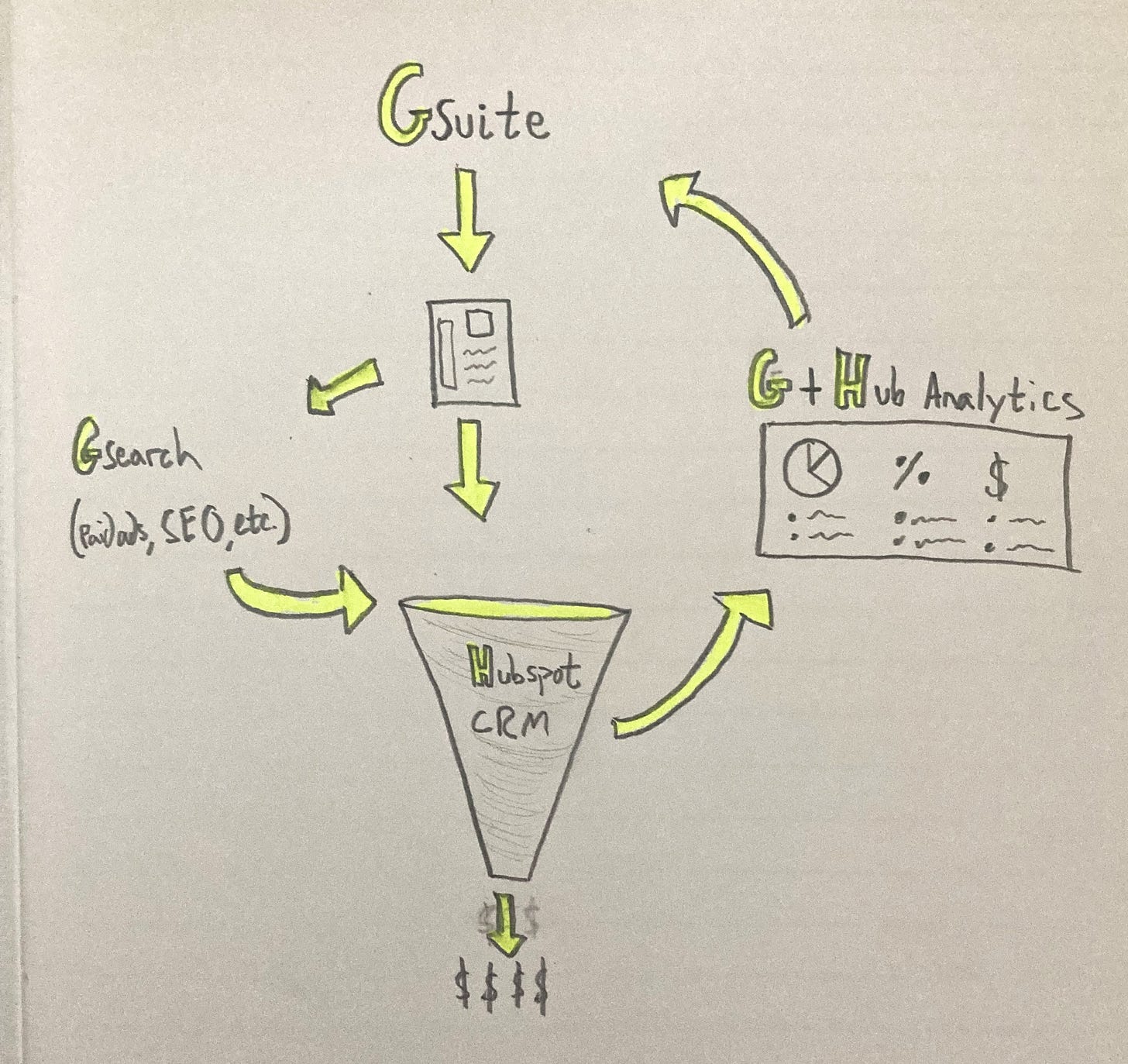#28 - If Google bought Hubspot...
It appears Google has abandoned their efforts to acquire Hubspot for Wiz.
It’s hard to believe that a major acquisition is not a distraction from Gemini’s early stumbles and recent headlines about employees too focused on social issues.
These two companies are wildly different - Cloud Security vs. B2B Martech - and paints a picture of a company not exactly sure of their long-term business strategy in the face of massive market shifts vis-à-vis AI.
Could this be a mid-life crisis?
In any case, this isn’t an article about whether Google will buy a Red Corvette or Porsche 911. Nor am I in a position to wax poetically on Google’s M&A strategy.
But it is fun to think about what the world of GTM would look like following a Hubspot acquisition.
It certainly would have put them in an enviable position to dominate the B2B market by building a closed-loop ecosystem.
Let’s take a look at a few of the components:
GSuite (Pre-top of Funnel)
In my opinion, Google Suite is the best workplace productivity solution of all time. Their solutions are easy-to-use and configure well into user workflows - propelling them well ahead of the bulky Microsoft Office Suite that is more prevalent in the enterprise.
While the product quality of Google Docs, Sheets, Slides, et al my be marginally inferior to their Microsoft counterparts in a vacuum, they are cloud-native and integrate with each other (and Gmail) seamlessly which significantly increases the efficiency of teams getting projects completed.
What’s more, because multiple people can work in one version of a project in real-time they’ve all but stamped out issues related to version control. Microsoft can do this with Sharepoint, but it’s not very good.
What would this mean for Hubspot and GTM teams?
For starters, integrations between GSuite and Hubspot’s CRM & Marketing solutions will allow content marketers to both efficiently increase the production of content marketing material AND distribute it through Hubspot to nurture pre-funnel leads, in-funnel prospects and customers.
Enhanced integrations will enable content and demand gen marketing teams to run leaner and generate significant productivity gains.
Google Paid Ads, SEO and Website Analytics (Top of Funnel)
Admittedly, I don’t have a wealth of knowledge on these solutions as an end-user.
However, their primary objective is to place company content in the Google Search ecosystem to increase brand awareness, measure impact, and ultimately reach in-market target buyers
For instance, if someone in Kansas Googles “I need an autobody shop in my area” the supplier who meets the company/location criteria AND pays Google the most will be at the top of the search list.
The buyer will then visit the website and will either make an appointment, or if not, banner ads of that autobody shop will pop up wherever else they decide to go on the internet.
If they visit the website enough, the autobody shop may be able to capture their information and proactively send them outreach to further increase their odds of moving into the funnel.
These Google Solutions are already rich with APIs that allow for some level of automation to port them into their CRM system.
If Google owned Hubspot, however, significant investments will be made into providing more out-of-the-box, automated workflows for nurturing prospects and customers alike to increase customer acquisition, repeat buyer and retention rates.
The Virtuous Circle (HubSpot as the True Hub)
The real value is in being able to manage all of these workflows and automations in one single pane of glass without the need for a tech expert to implement and manage it.
A lean marketing team can:
Ideate in Google Docs, Slides and Sheets
Refine those ideas into marketing assets with Hubspot design templates
Push those marketing assets out into the Google Search ecosystem to drive pre-funnel lead generation AND to the prospects and customers that exist into the CRM.
All of this can be measured and analyzed within a combination of Google/Hubspot analytical machine to maximize ROI on marketing spend.
If marketers can do this in one system, with greater plug-and-play functionality, a team of 50 marketers could be reduced to a team of 5, with more targeted, strategic output based on data-driven insights.
Hubspot will also have the benefit of leveraging the best engineers in the world who can not only enhance the existing products set and build tighter integrations with easier to implement automated workflows, but can also layer the power of Gemini to turbocharge actionable insights and provide recommendations on what to do next in order to achieve significant revenue growth.
If Google was wondering how to more effectively displace Microsoft Office (especially as OpenAI becomes a more strategic component of those solutions) at the enterprise level, this acquisition would be a game-changer.
Microsoft Dynamics (their CRM) is a joke, and there is no real relationship with Salesforce. A Google + Hubspot solution would be well positioned to dominate this market.
In the day and age of tool overload, the companies that win will be the companies that ensure customers use as few tools as possible to achieve their business goals.


